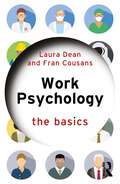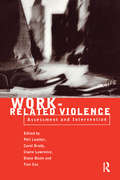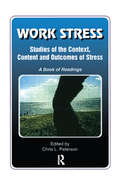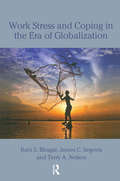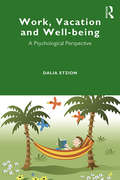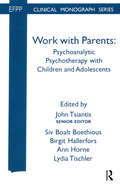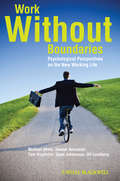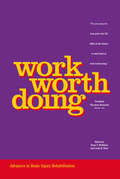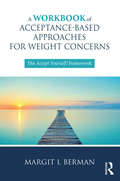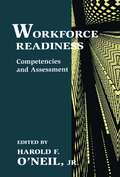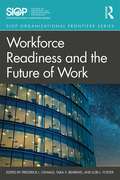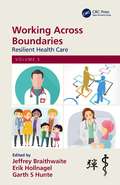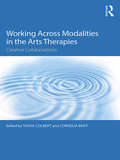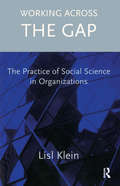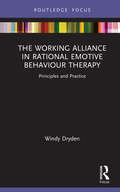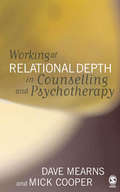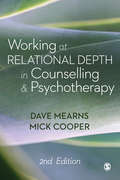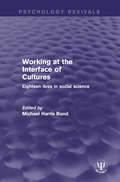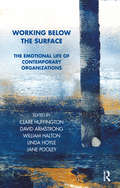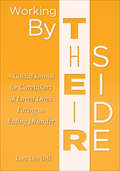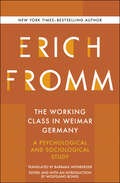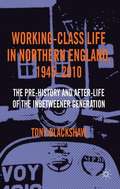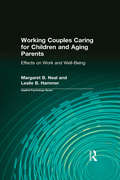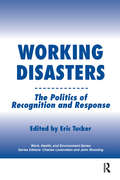- Table View
- List View
Work Psychology: The Basics (The Basics)
by Laura Dean Fran CousansWork Psychology: The Basics provides an accessible, jargon-free introduction to the fundamental principles of work and occupational psychology. Covering key theories and models in this dynamic area, it offers a solid understanding of both academic theory and practical applications. The book follows the structure of the British Psychological Society curriculum for Masters courses, exploring psychological assessment at work, learning, training and development; wellbeing at work, work design, organisational change and development, and leadership, engagement and motivation. These core topics are supplemented by deep dives into the development of the discipline, research and practice in the field, and suggestions for the future of work psychology. Giving a detailed look into the world of work, it answers questions such as: Can we accurately select people for jobs? How can work positively and negatively affect mental and physical health? How can we motivate people in the workplace? What makes a good leader? It also explores issues around types of research and what effective research looks like in this area. Supported by a helpful guide on the routes to chartership in the UK and working in the area, as well as a glossary of key terms and suggestions for further reading, this is the ideal introductory text for students. It will also interest those looking to understand the subject more generally and complete training in the area.
Work-Related Violence: Assessment And Intervention
by Phil LeatherRecent reports suggest that violence in the workplace is an increasingly common problem for organizations, and that violence -or the threat of it- is one of the major sources of stress at work. Work-Related Violence examines the causes and consequences of violence at work, and offers practical solutions for managers and organizational psychology professionals. Part one reviews the size and scope of the problem and sets out the need for intervention and policy. Part two provides case studies of organizations and settings in which such an approach has been applied.
Work Stress: Studies of the Context, Content and Outcomes of Stress: A Book of Readings
by Chris PetersonSociologists and health experts from the U.K., Scandinavia, Australia, and the U.S. discuss issues surrounding stress in the workplace, including its causes and ways in which jobs can be designed to minimize it. The book is intended for professionals and students in occupational health and safety.
Work Stress and Coping in the Era of Globalization
by Rabi S. Bhagat Terry Nelson James SegovisThis book examines the phenomena of how individuals experience work stress and coping in both developed and developing countries in the world. Rabi Bhagat, known for his cross-cultural scholarship in this area, and his co authors, help us recognize the causes and consequences of work stress. They present a systematic, comprehensive review of this topic with plenty of practical insights and case studies examining work stress and coping in the era of globalization. Researchers, practitioners and students in the field of industrial organizational psychology, organizational behavior, and human resources management will find this book of interest.
Work, Vacation and Well-being: Who's afraid to take a break?
by Dalia EtzionBased on a twenty-year research study, Work, Vacation and Well-being delves into the ubiquitous yet often-underestimated issues surrounding vacation and respite. Providing an original outlook on how breaks from work can be beneficial for the well-being of employees, this book also addresses the potential negative impacts of vacation. Taking into account factors concerning the nature of the break and the person taking it, Etzion delves into the benefits and drawbacks of workplace breaks, from annual leave to maternity leave and sabbaticals. Work, Vacation and Well-being looks at breaks from work through various social and cultural lenses, to present a balanced and well-researched perspective on all angles of taking a break. Perfect for students of Organizational and Health Psychology, Work, Vacation and Well-being also widely appeals to those studying Social Policy, Management Studies, Occupational Health and Research Methods.
Work with Parents: Psychoanalytic Psychotherapy with Children and Adolescents (The\efpp Monograph Ser.)
by John Tsiantis Siv Boalt Boethious Birgit Hallerfors Ann Horne Lydia Tischler Margaret RustinDrawing on the rich range and depth of the clinical experience of the contributors, this welcome volume will be a valuable tool for clinicians and trainees. The authors share a powerful commitment to the relevance and value of psychoanalytically based work with parents - an area all too often inadequately provided for - and provide heartening evidence of the resilience and intellectual vitality of the various strands within this tradition. Part of the EFPP Monograph Series.
Work Without Boundaries
by Michael Allvin Gunn Johansson Gunnar Aronsson Tom Hagström Ulf LundbergDrawing on more than a decade of inter-disciplinary research, this book provides a comprehensive overview of the available theories, concepts, data and research on new work organizations and the concept of 'work without boundaries'.Explores a concept of work that is not restricted by traditional organizational rules like regular office hours, a single workplace, fixed procedures and limited responsibilityProvides a comprehensive overview of the available theories, concepts, data and research on new work organizationsExamines the shift of power away from organizations to make individuals accountable for their own employability and workDraws on over a decade of original research into 'work without boundaries' in which the authors are key authoritiesBrings together organization theory and work psychology with scholarship from related fields including sociology, social psychology, cognition and psychobiology
Work Worth Doing: Advances in Brain Injury Rehabilitation
by Brian T. Mcmahon Linda R. ShawPresident Theodore Roosevelt once said, "Far and away the best prize that life offers is the chance to work hard at work worth doing." This quote is not only the source from which the title was borne, but also the philosophical approach toward TBI rehabilitation embraced by the 26 rehabilitation experts who wrote Work Worth Doing: Advances in Brain Injury Rehabilitation. This important, and possibly controversial, book of issues and methods addresses the full spectrum of vocational rehabilitation activities. Independent living, treatment generalization, criteria for evaluating TBI rehabilitation facilities, family involvement issues, and an entirely new perspective on the TBI rehabilitation industry are discussed.
A Workbook of Acceptance-Based Approaches for Weight Concerns: The Accept Yourself! Framework
by Margit BermanThis three-part workbook offers a concise and forgiving research- based guide to clients’ diffi culties with sustained weight loss. Part 1 is a review of your client’s previous efforts at weight control and image change, as well as information and a review of research to help your client understand why weight loss might not have worked in the past. Part 2 contains information and exercises to help your client develop a new acceptance of their body and their relationship with food, as well as tools to develop mindfulness and self- compassion. Part 3 will help your client identify, experiment with, and commit to values related to food, appearance, and other important areas of life, tackling troublesome mental and practical barriers along the way.
Workforce Readiness: Competencies and Assessment
by Harold F. O'NeilCurrent economic difficulties and the challenge of competing in the world market have necessitated a rethinking of American approaches to the utilization of people in organizations. Management now recognizes a need to have workers take on more responsibility at the points of production, of sale, and of service rendered if the United States is to compete in rapidly changing world markets. This development means that much more is expected of even entry-level members of the American workforce. Thus, even more is expected of our high schools and colleges to provide this type of workforce. The need of American management for workers with greater skills and who can take on greater responsibility has spawned many commissions, task forces, and studies. All of them have contributed to the vast evidence documenting the need for a more highly skilled workforce. These studies are summarized and synthesized in this book. However, what remains largely undone is the development of methods to assess the necessary skills that have been identified. A major portion of this book deals with assessment issues. Workforce Readiness: Competencies and Assessment explores the state-of-the-art in the specification of competencies (skills) and their assessment for students entering the world of work from both high school and college. Both individual and team competencies are examined via data that has been reported and collected in various settings--schools, laboratories, and industrial facilities.
Workforce Readiness and the Future of Work (SIOP Organizational Frontiers Series)
by Fred Oswald Tara S. Behrend Lori FosterWorkforce readiness is an issue that is of great national and societal importance. For the United States and other countries to thrive in a globally interconnected environment of wide-ranging opportunities and threats, the need to develop and maintain a skilled and adaptable workforce is critical. National investments in job training and schools remain essential in stimulating businesses and employment agencies to collaborate productively with educators who provide both training and vocational guidance. Workforce Readiness and the Future of Work argues that the large-scale multifaceted efforts required to ensure a reliable and strong supply of talent and skill in the U.S. workforce should be addressed systematically, simultaneously, and systemically across disciplines of thought and levels of analysis. In a four-part framework, the authors cover the major areas of: education in the K-12, vocational, postsecondary, and STEM arenas; economic and labor market considerations; employment, organizations, and the world of work; laws, policies, and budgets at the federal, state, local, and military levels. With contributions from leading scholars, this volume informs high-priority workforce effectiveness issues of current and future concern and concrete research, practice, and policy directions to generate novel insights of a multilevel and system-wide nature.
Working Across Boundaries: Resilient Health Care, Volume 5
by Jeffrey Braithwaite Erik Hollnagel Garth S HunteThe book demonstrates how Resilient Health Care principles can enable those on the frontline to work more effectively towards interdisciplinary care by gaining a deeper understanding of the boundaries that exist in everyday clinical settings. This is done by presenting a set of case studies, theoretical chapters and applications that relate experiences, bring forth ideas and illustrate practical solutions. The chapters address many different issues such as resolving conflict, overcoming barriers to patient-flow management, and building connections through negotiation. They represent a range of approaches, rather than a single way of solving the practical problems, and have been written to serve both a scientific and an andragogical purpose. Working Across Boundaries is primarily aimed at people who are directly involved in the running and improvement of health care systems, providing them with practical guidance. It will also be of direct interest to health care professionals in clinical and managerial positions as well as researchers. Presents the latest work of the lauded Resilient Health Care Net group, developing applications of Resilience Engineering to health care, furthering safety thinking and generating applicable solutions that will benefit patient safety worldwide Enables health care professionals to become aware of the boundaries that affect their work so that they are able to use their strengths and overcome their weaknesses Written from a Safety-II perspective, where the purpose is to make sure that as much as possible goes well and the focus therefore is on everyday work rather than on failures. There are at present no other books that adopt this perspective nor which go into the practical details Provides a concise presentation of the state of resilient health care as a science, in terms of major theoretical issues and practical methods and techniques on the overarching and important topics of boundary-crossing and integration of care settings
Working Across Modalities in the Arts Therapies: Creative Collaborations
by Tasha Colbert Cornelia BentWorking Across Modalities in the Arts Therapies: Creative Collaborations offers an in-depth insight into cross-modality and transdisciplinary practice in the arts therapies. Including contributions from drama, music, dance movement and art therapists, as well as professionals from related disciplines, it vividly demonstrates how the alchemy of these collaborations produces innovative interventions and new approaches to working with clients. Compelling examples of collaborative practice cover a variety of client groups, ranging from Syrian refugee children and women with eating disorders, to homeless war veterans and sex offenders. Together, the authors make the case for the effectiveness of cross-modal and transdisciplinary approaches when working with otherwise hard-to-reach and complex populations. This book is a guide to good practice and an invaluable resource for both experienced arts therapists and those new to the field. It will also be of benefit to healthcare and education professionals, arts practitioners, and anyone with an interest in the subject.
Working Across the Gap: The Practice of Social Science in Organizations
by Lisl KleinThe author's experience of applying the social sciences in organizations must be unique. Her work is grounded in research but much of her professional activity has been in application, combining the methods and findings of research with an understanding of dynamics in working with organizations. Moving between research and practice she has, for nearly forty years, pursued the aim of rendering the social sciences useful and practical in organizational life. This collection of papers brings together wide-ranging material that is highly relevant to today's world, whilst also providing a useful historical overview of the field. The links between research, policy and practice are brought vividly to life, the many examples creating a thread that connects theory with operational reality. The author provides an insightful and significant theory of practice, developed through vignettes of her work and experience that make this a very readable and engaging book.
The Working Alliance in Rational Emotive Behaviour Therapy: Principles and Practice (Routledge Focus on Mental Health)
by Windy DrydenThe Working Alliance in Rational Emotive Behaviour Therapy explores the principles and practice of REBT from the perspective of working alliance theory. Windy Dryden seeks to debunk the myth that REBT neglects the therapeutic relationship by breaking down working alliance theory into specific domains in order to highlight its potential in this form of therapy. He introduces the reader to the ABCs of REBT and its basic practice, followed by the working alliance concept that forms the basis of this book. He then shows how the practice of REBT can be enhanced by the therapist attending to each of the four components of the alliance: bonds, views, goals and tasks. The book is written for trainees and established therapists within REBT.
Working at Relational Depth in Counselling and Psychotherapy
by Dave Mearns Mick CooperWorking at Relational Depth in Counseling and Psychotherapy is a groundbreaking text which goes to the very heart of the therapeutic meeting between therapist and client. Focusing on the concept of 'relational depth,' authors Dave Mearns and Mick Cooper describe a form of encounter in which therapist and client experience profound feelings of contact and engagement with each other and in which the client has an opportunity to explore whatever is experienced as most fundamental to her or his existence.
Working at Relational Depth in Counselling and Psychotherapy
by Professor Dave Mearns Professor Mick CooperEagerly awaited by many counsellors and psychotherapists, this new edition includes an updated preface, new content on recent research and new developments and debates around relational depth, and new case studies. This groundbreaking text goes to the very heart of the therapeutic meeting between therapist and client. Focusing on the concept of 'relational depth', the authors describe a form of encounter in which therapist and client experience profound feelings of contact and engagement with each other, and in which the client has an opportunity to explore whatever is experienced as most fundamental to her or his existence. The book has helped thousands of trainees and practitioners understand how to facilitate a relationally-deep encounter, identify the personal ‘blocks’ that may be encountered along the way, and consider new therapeutic concepts – such as 'holistic listening' – that help them to meet their clients at this level. This classic text remains a source of fresh thinking and stimulating ideas about the therapeutic encounter which is relevant to trainees and practitioners of all orientations.
Working at Relational Depth in Counselling and Psychotherapy
by Professor Dave Mearns Professor Mick CooperEagerly awaited by many counsellors and psychotherapists, this new edition includes an updated preface, new content on recent research and new developments and debates around relational depth, and new case studies. This groundbreaking text goes to the very heart of the therapeutic meeting between therapist and client. Focusing on the concept of 'relational depth', the authors describe a form of encounter in which therapist and client experience profound feelings of contact and engagement with each other, and in which the client has an opportunity to explore whatever is experienced as most fundamental to her or his existence. The book has helped thousands of trainees and practitioners understand how to facilitate a relationally-deep encounter, identify the personal ‘blocks’ that may be encountered along the way, and consider new therapeutic concepts – such as 'holistic listening' – that help them to meet their clients at this level. This classic text remains a source of fresh thinking and stimulating ideas about the therapeutic encounter which is relevant to trainees and practitioners of all orientations.
Working at the Interface of Cultures: Eighteen Lives in Social Science (Psychology Revivals)
by Michael Harris BondBehind the mask of objective science lie the dynamics of what happens to scientists who go to live and work in another culture. Those who work and study in an alien culture often find themselves changed in ways that affect their scientific work. How does this challenge, stimulate, provoke, suggest and inspire advances and novelty in their theories, methods and instruments? Originally published in 1997, each of the essays in this title explores these issues through the experiences of a distinguished practitioner, describing the process of intellectual growth and development. Chosen for their extensive experience with people holding a different worldview, the authors have all achieved renown for their contributions to the social science of culture.
Working Below the Surface: The Emotional Life of Contemporary Organizations (Tavistock Clinic Series)
by David Armstrong Jane Pooley Clare Huffington William Halton Linda HoyleThe chapters contributed to this book have been written by the staff and associates of The Tavistock Consultancy Service, whose distinctive competence is in the human dimension of enterprise and the dynamics of the workplace. The intention is to identify and explore some of the key themes that have emerged, such as the emotional world of the organisation and the dynamics of resistance to change, and how these affect and influence the understanding of leadership and management in contemporary organizations. No attempt is made to reach a consensus, but rather to raise and map out a territory of continuing question and debate. Contributors:David Armstrong; Andrew Cooper; Tim Dartington; William Halton; Sharon Horowitz; Linda Hoyle; Clare Huffington; Kim James; Sarah Miller; Anton Obholzer; Jane Pooley; and Nick Temple. Part of the Tavistock Clinic Series.
Working By Their Side: A Guided Journal for Caretakers of Loved Ones Facing an Eating Disorder
by Lara Lyn BellFor caretakers of those struggling with eating disorders, this workbook and journal helps process and utilize the guidance offered in By Their Side. The Lara Lyn Bell team knows the healing power of journaling firsthand. In Working By Their Side, they offer guidance for further reflection on the advice, testimonials, and resources found in By Their Side.Working By Their Side fosters meaningful discovery through prompts that encourage openness and honesty. The workbook’s educational components prepare readers to fully engage in treatment, giving them a healthy head start in therapy that can put them years ahead in the process.
The Working Class in Weimar Germany: A Psychological and Sociological Study
by Erich Fromm&“The analysis unveils a sociotypology of [the working class] on the eve of the Third Reich, its potential for resistance as well as seduction.&” —Political Psychology Building upon Fromm&’s 1929 lecture &“The Application of Psycho-Analysis to Sociology and Religious Knowledge,&” in which he outlined the basis for a rudimentary but far-reaching attempt at the integration of Freudian psychology with Marxist social theory, this study is an attempt to obtain evidence about the systemic connections between &“psychic make-up&” and social development. Originally an investigation of the social and psychological attitudes of two large groups in Weimar Germany, manual and white-collar workers, a questionnaire was developed to collect data about their opinions, lifestyles, and attitudes—from what books they read and their thoughts on women&’s work to their opinions about the German legal system and the actual distribution of power in the state.The Working Class in Weimar Germany can ultimately help us understand the establishment of fascism after 1933—that despite all the electoral successes of the Weimar Left, its members were not in the position, owning to their character structure, to prevent the victory of National Socialism.
Working-Class Life in Northern England, 1945–2010
by Tony BlackshawTaking a fresh look the history of northern working-class life in the second half of the twentieth century, this book turns to the concept of generation and generational change. Using life history research conducted with the intermediary generation that preceded the Boomers, the author explores Zygmunt Bauman's bold vision of modern historical change as the shift from solid modernity to liquid modernity. Blackshaw argues that this shift was marked by a 'pure event' that led to the onset of the twentieth-century Interregnum in which 'a great variety of interesting phenomena did appear', but most notably a revolution in everyday life that radically altered the reigning structures of time and order.
Working Couples Caring for Children and Aging Parents: Effects on Work and Well-Being (Applied Psychology Series)
by Margaret B. Neal Leslie B. HammerAs the baby boomer generation approaches midlife, many dual-earner couples are struggling with issues of simultaneously caring for children while tending to aging parents. This timely book uncovers the circumstances faced by these workers, known as the “sandwiched generation”, and identifies what they need in order to fulfill their work and family responsibilities. Authors Margaret B. Neal and Leslie B. Hammer suggest the workplace as an arena for change, proposing that it adapt to the situations of today’s workers by providing flexibility and understanding the needs and priorities of families. Based on a four-year national study funded by the Alfred P. Sloan Foundation, Working Couples Caring for Children and Aging Parents examines: employer and governmental initiatives affecting work and family life in the United States; supports provided to working caregivers in countries other than the United States; the effects of being “sandwiched” on work-family fit, well-being, and work; and changes in work and family roles and outcomes over time. This book will interest a broad audience, including students, policymakers, family care practitioners, IO psychologists, work-life professionals, gerontologists, sociologists, human resource managers, and occupational health psychologists.
Working Disasters: The Politics of Recognition and Response (Work, Health and Environment Series)
by Eric TuckerEvery day, workers are injured, made ill, or killed on the job. Most often, workers experience these harms individually and in isolation. Particular occurrences rarely attract much public attention beyond, perhaps, a small paragraph in the local newspaper. Instead, these events are normalized. This membrane of normalcy, however, is ruptured from time to time, especially after a disaster. This edited collection draws together original case studies written by leading researchers in Australia, Canada, Great Britain, Sweden, and the United States that examine the politics of working disasters. The essays address two fundamental questions: what gets recognized as a work disaster? And how does the state respond to one? In some instances, it seems self-evident that a disaster has occurred. For example, when a mine explodes killing tens or hundreds of workers simultaneously, the media and politicians recognize that this is not just a personal tragedy for the families of the victims, and that more troubling questions need to be asked about how this could happen. In other circumstances, however, the process that determines what gets recognized as a disaster is much more complicated. "Working Disasters" addresses the politics of recognition in case studies of the long-haul trucking industry, repetitive strain injuries, and lung disease in miners. Once it has recognized that a working disaster has occurred, the state typically goes beyond its routine responses to the daily toll of work-related deaths and injuries. Inquiries may be initiated to review the adequacy of regulatory systems and laws may be amended. Sometimes disasters produce meaningful change, but often they do not. In this text, the politics of response is considered in studies of a factory fire, the loss of an offshore oilrig, lung disease among miners, a mine explosion, and the prosecution of health and safety offences. This book will be of use to occupational health and safety activists and professionals; academics and upper-year students in: industrial relations, labour studies, labour history, law, political science, and sociology.
